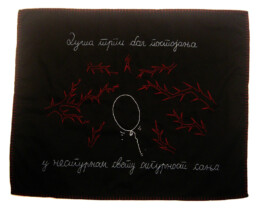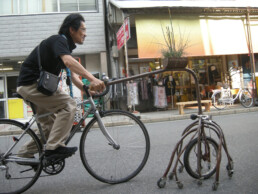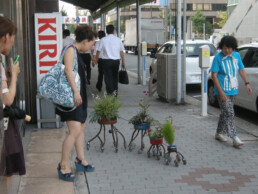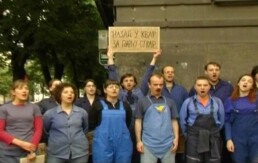Škart
Like a comet, the manager falls down to land, felled by a worker’s mighty hand, 2006
text, drawing and embroidery: Lenka Zelenović
40 x 35 cm
From your terrace, rubbish do not dump, or everyone will see you’re a slovenly frump, 2007
text, drawing and embroidery: Lenka Zelenović
47 x 30 cm
Everyone wants to go very fast, till the end of our lives we’ll surely last, 2012
text and embroidery: Brigita Međo
drawing: Vladan Nikolić
68 x 45 cm
The pain of existence makes the soul burst at the seams, in an uncertain world, of safety it dreams, 2012
text and embroidery: Brigita Međo
drawing: Vladan Nikolić
68 x 55 cm
Dish-Familysh, Bush-o-Rush, 2010
Plant-o-biles Serie
ambiental mobile installation
variable dimensions
Action “Backwards”/ poster of the action “Backwards”, 2008-2018
Video / offset paper print (poster)
5’22’’, poster 48 x 20 cm
Edition: 6
New embroideries
series of embroidery on canvas
Like a comet, the manager falls down to land, felled by a worker’s mighty hand, 2006
text, drawing and embroidery: Lenka Zelenović
40 x 35 cm
From your terrace, rubbish do not dump, or everyone will see you’re a slovenly frump, 2007
text, drawing and embroidery: Lenka Zelenović
47 x 30 cm
Everyone wants to go very fast, till the end of our lives we’ll surely last, 2012
text and embroidery: Brigita Međo
drawing: Vladan Nikolić
68 x 45 cm
The pain of existence makes the soul burst at the seams, in an uncertain world, of safety it dreams, 2012
text and embroidery: Brigita Međo
drawing: Vladan Nikolić
68 x 55 cm
The works from the New Embroideries Series were exhibited at the 48th October Salon, Micro-Narratives. The Škart Group won the 48th October Salon Award for this work.
“In the summer of 2000, we took courage to encourage several women’s groups to, after a century and a half of transcribed embroideries, put their own views and doubts on canvas. Since then, embroideries have emerged that no longer deal only with the idyllic image of an obedient, God-fearing, naive housewife, but also with the readiness to face family, social and political prejudices.
Small is big. Kitchen whispers are remembered longer than school dictations. New embroideries are here to replace the wrong ideas.”
Škart, from the catalogue of the 48th October Salon
The initiative with New Embroideries gave new life to the traditional embroideries, which, besides the walls in households, find their place in art galleries, and give various authors who create them the opportunity to become equal actors on the contemporary art scene. Lenka Zelenović, one of the most prominent members of the Škart Group, has so far made hundreds of them, with different motives and messages, referring to the critique of the local political situation, ecological and emotional messages.
© Cultural Centre of Belgrade, the October Salon Collection and the artists
Gift Contract: III-5-291/1/25.9.2014.
Inventory No: 39, 40, 41,42
Photo: Courtesy of the artists, Milan Kralj
Selected Bibliography:
48th October Salon, Micro-Narratives. Cultural Centre of Belgrade, 2007
Nove kuvarice umjetničke grupe Škart, Vox Femine, Oct. 29, 2012, https://voxfeminae.net/vijesti/nove-kuvarice-umjetnicke-grupe-skart/ (accessed on Apr. 26, 2020)
Iva Parađanin, “Feministički i borbeni vezovi žena Srbije”, VICE, May 18, 2017, https://www.vice.com/rs/article/gvzkey/feministicki-i-borbeni-vezovi-zena-srbije (accessed on Apr. 26, 2020)
Dish-Familysh, 2010
Bush-o-Rush, 2010
Plant-o-biles Serie
ambiental mobile installation
variable dimensions
Plant-o-biles is part of a larger installation, i.e., the exhibition titled Seesaw Play-Grow (a polygon of imbalance), which the Škart Group made for the Serbian Pavilion at the 12th Biennial of Architecture in Venice in 2010.
The installation consists of two families: the family-sneakers and the plant-rollers.
“Seesaw Play-Grow” is a metaphor for space, which with its dynamics and contrast should provoke the observer to find answers to questions about the essence of the work. “Mobile plants” and “Seesaw” question the relationship between the urban environment and nature. “Mobile plants” as a kind of counter-object invite play and dialogue.
They reflect on the relationship between the urban environment and nature and are inspired by Vasko Pope’s “Velegradska pesma” (The Big City Song): “My wife, for whom I would do anything, told me that I wish I had a little tree to run after me everywhere along the street!”
© Belgrade Cultural Center, Collection October Salon and Artists
Purchase Agreement: III-5-497/1/22.12.2014, III-5-498/1/22.12.2014.
Inventory number: 69, 70
Photo: Courtesy of the artist
Selected bibliography:
Škart: Halftime, 9–26.10.2012, retrospective exhibition catalogue, Museum of Applied Arts, Belgrade, 2012.
Action “Backwards”/ poster of the action “Backwards”, 2008-2018
Video / offset paper print (poster)
5’22’’, poster 48 x 20 cm
Edition: 6
The action Backwards was originally performed by the “Horkeškart” chorus on 9 June 2006. The goal of the action was to sing the song Backwards in front of institutions that were principally accountable for the explosion of nationalism, the collapse of SFRY (Socialist Federal Republic of Yugoslavia) and the civil wars of 1990s in Yugoslavia. The institutions are (in the order of appearance in the film): the Rectorate of the University of Belgrade, the Serbian Academy of Arts and Sciences, the Serbian Orthodox Church (the Patriarchate), the Supreme Court and the Government of the Republic of Serbia.
The second Backwards action was performed by the “Proba” chorus, after an initiative by NGO “Women in Black” and within the “Coalition for a Secular State”, on 10 December 2007 in Belgrade’s Republic Square, as part of an observance of Human Rights Day.
© Cultural Centre of Belgrade, October Salon Collection and the Artist
Mining agreement: III-5-38/17.02.2023
Inventory no: 180
Photo: a square from the video
ABOUT THE AUTHORS:
Škart is a collective founded in 1990 at the Faculty of Architecture in Belgrade. The group consists of architects-designers Đorđe Balmazović Žole (1965, Belgrade, Serbia) and Dragan Protić Prota (1965, Zrenjanin, Serbia) with the occasional participation of various artists, colleagues, acquaintances, craftsmen or amateur poets. Their art is created on the borders of activism, poetry, music, architecture, fine and applied arts. A wide field of activity enables the members of the group the “social production of space”, i.e., a unique impact on the society in which they act, within the art system or completely outside it. The group’s activities in urban environments, as well as in outlying areas, show courage and inventiveness, with a certain dose of lucidity and activist humour, which are the elements of this collective’s aspiration to deal with some issues of modern society in a witty and analytical way. The first decade (1990 – 2000) was marked by “samizdat” books and their distribution in the street actions. In the second decade (2000 – 2010), the group co-founded several new collectives: the choirs Horkeškart and Proba, children’s choirs Deca sa meseca and AprilZMAJun, the youth-retired person’s choir HOR-RUK and the antifascist choir UHO (united choirs). Since 2010 the collective has been increasingly involved in working with children (at the “Vera Radivojević” Children’s Home in Bela Crkva) and with retired people. They have exhibited as a group and individually at numerous exhibitions in the country and abroad. In 2010 they represented Serbia at the Venice Biennale of Architecture.
www.skart.rs



